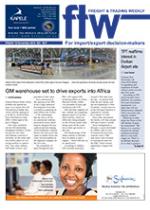The airfreight industry’s
paperless march has gained
momentum following a
decision by the World
Customs Organisation to
work towards reducing paperbased
documentation that
accompanies international
air cargo shipments. And the
move has been welcomed by
The International Air Cargo
Association as a ‘significant
step forward’.
The WCO will begin
by undertaking a survey
within the WCO member
administrations and partner
organisations to list the top
priority documents to be
dematerialised.
It will also discuss
measures to promote digital
signatures as a means to
maintain authenticity and
integrity of documents.
Discussions on the
end-to-end management
of electronic documents
with other international
organisations will be initiated
and work will begin on a
WCO Recommendation
based on the proposed
Guidelines on Supporting
Documents.
Tiaca secretary general,
Daniel Fernandez, said the
WCO’s commitment was a
constructive response to a
long-standing and substantial
business difficulty.
“We work in a world
where international air
consignments, managed by
global traders through finetuned
automated business
technologies and moving on
modern aircraft controlled
and tracked by state of the
art communication systems
are still subject to completely
anachronistic paper-based
checks on millions of import
transactions annually.”
One global express
operator has calculated that
two all-cargo 747s would be
needed to move all paper
demanded every year of his
own company.
“The overall cost is not
just funding this unnecessary
carbon footprint but the extra
and incalculable cumulative
cost of all the delays inherent
in preparing, presenting and
processing these pieces of
paper in a predominantly
electronic business and
administrative environment,”
said Fernandez.
Tiaca has been
highlighting this costly
anomaly for many years
and has made its abolition a
major facilitation objective.
It has called on governments
and relevant international
institutions to eliminate
any but the most essential
documents and turn the
remainder into internationally
standard electronic messages.
“Clearly this process
will take some time but
the WCO’s acceptance
of the need for reform is
extremely welcome and can
be supported by the increased
paperless trading and
automation solutions being
implemented by the air cargo
industry through initiatives
such as Iata e-freight and
Cargo 2000,” he said.
Customs buy-in adds impetus to airfreight’s paperless chase
19 Nov 2010 - by Staff reporter
0 Comments
FTW - 19 Nov 10

19 Nov 2010
19 Nov 2010
19 Nov 2010
19 Nov 2010
19 Nov 2010
19 Nov 2010
19 Nov 2010
19 Nov 2010
19 Nov 2010
Border Beat
16 Apr 2025
